#Seiとは
Explore tagged Tumblr posts
Text
【めちゃくちゃ分かりやすい】Sei (セイ) 完全ガイド:特徴・技術・将来性を丸ごと解説
#有望銘柄の徹底解説#DeFi#SeiDeFi最適化#セイ#Sei使い方DeFi#sei#Sei高速理由#レイヤー1#Seiネットワークエコシステム#DEX#暗号資産Sei初心者#メリット#Seiレイヤー1違い#分散型取引所#Seiとは#オーダーブック#SeiオーダーブックDEXメリット#特徴#DeFiブロックチェーンSei#将来性#Sei技術解説#使い方#デメリット#高速#Seiブロックチェーン特徴#暗号資産#Sei将来性予測#仮想通貨#スループット#ブロックチェーン
0 notes
Text

30 Of My favorites Compliments in Japanese to Praise Artists and Their Work
I love complimenting artists; I like them to know that their work is always amazing, and I enjoy motivating them. Since I started creating pixel art, I have become very close to Japanese artists and realized that it is much easier to compliment them in Japanese, as it seems to make them feel more comfortable! That’s why I put together a list of compliments! Feel free to use them and correct me!
1. 素晴らしい作品ですね。 (Subarashii sakuhin desu ne.)
“It’s a wonderful piece of work.”
2. とても感動しました。 (Totemo kandō shimashita.)
“I was very moved.”
3. あなたの才能に驚かされます。 (Anata no sainō ni odorokasaremasu.)
“I am amazed by your talent.”
4. 色使いが本当に綺麗ですね。 (Irozukai ga hontō ni kirei desu ne.)
“The use of colors is really beautiful.”
5. 細部まで丁寧に描かれていますね。 (Saibu made teinei ni kakareteimasu ne.)
“The details are drawn so carefully.”
6. ユニークなスタイルですね。 (Yunīku na sutairu desu ne.)
“You have a unique style.”
7. 本当に才能がありますね。 (Hontō ni sainō ga arimasu ne.)
“You truly have talent.”
8. 見ていてとても楽しいです。 (Miteite totemo tanoshii desu.)
“It’s very enjoyable to look at.”
9. 構図が素晴らしいです。 (Kōzu ga subarashii desu.)
“The composition is amazing.”
10. こんな作品を作れるなんて信じられません。 (Konna sakuhin o tsukureru nante shinjiraremasen.)
“I can’t believe you can create such a piece.”
11. とても独創的ですね。 (Totemo dokusōteki desu ne.)
“It’s very creative.”
12. あなたの作品はいつもインスピレーションを与えてくれます。 (Anata no sakuhin wa itsumo insupirēshon o ataete kuremasu.)
“Your work always gives me inspiration.”
13. 表現力が豊かですね。 (Hyōgenryoku ga yutaka desu ne.)
“Your expressive power is remarkable.”
14. 見るたびに新しい発見があります。 (Miru tabi ni atarashī hakken ga arimasu.)
“I discover something new every time I look at it.”
15. あなたの作品には心がこもっていますね。 (Anata no sakuhin ni wa kokoro ga komotteimasu ne.)
“Your work has so much heart in it.”
16. あなたの作品には魂が宿っています。 (Anata no sakuhin ni wa tamashī ga yadotteimasu.)
“Your artwork has a soul in it.”
17. 発想力がすごいですね。 (Hassōryoku ga sugoi desu ne.)
“Your creativity is amazing.”
18. あなたのスタイルはとても独特です。 (Anata no sutairu wa totemo dokutoku desu.)
“Your style is very distinctive.”
19. 作品に強いメッセージ性を感じます。 (Sakuhin ni tsuyoi messe-ji sei o kanjimasu.)
“I feel a strong message in your work.”
20. この作品を見ると、何かを感じずにはいられません。 (Kono sakuhin o miru to, nanika o kanjizu ni wa iraremasen.)
“I can’t help but feel something when I look at this piece.”
21. あなたの作品を見ていると、とても幸せな気持ちになります。 (Anata no sakuhin o miteiru to, totemo shiawase na kimochi ni narimasu.)
“Looking at your work makes me feel very happy.”
22. どの作品も心に響きます。 (Dono sakuhin mo kokoro ni hibikimasu.)
“Every piece of your work resonates with my heart.”
23. この作品の雰囲気がとても好きです。 (Kono sakuhin no fun’iki ga totemo suki desu.)
“I really like the atmosphere of this piece.”
24. あなたのアートはとても洗練されています。 (Anata no āto wa totemo senren sareteimasu.)
“Your art is very refined.”
25. この作品からインスピレーションをたくさんもらいました。 (Kono sakuhin kara insupirēshon o takusan moraimashita.)
“I received a lot of inspiration from this piece.”
26. あなたの技術は素晴らしいです。 (Anata no gijutsu wa subarashii desu.)
“Your technique is superb.”
27. これからの作品も楽しみにしています。 (Korekara no sakuhin mo tanoshimi ni shiteimasu.)
“I’m looking forward to your future works as well.”
28. 色彩の使い方がとても巧みですね。 (Shikisai no tsukaikata ga totemo takumi desu ne.)
“Your use of colors is very skillful.”
29. こんなに素晴らしい作品を見たことがありません。 (Konna ni subarashii sakuhin o mita koto ga arimasen.)
“I’ve never seen such an amazing piece of work.”
30. あなたの描くキャラクターはとても魅力的です。 (Anata no kaku kyarakutā wa totemo miryokuteki desu.)
“The characters you draw are very captivating.”

Some observations made by my Japanese study friends!

1. あなたの作品には魂が宿っています。
This phrase is correct, but it’s quite poetic. If you want a simpler expression:
あなたの作品には力強さを感じます。 (Anata no sakuhin ni wa chikarazuyosa o kanjimasu.)
“I feel strength in your work.”
2. 発想力がすごいですね。
Correct and commonly used.
3. あなたのスタイルはとても独特です。
Correct, but for a softer tone, you could say:
あなたのスタイルはとても個性的ですね。 (Anata no sutairu wa totemo koseiteki desu ne.)
“Your style is very unique and individual.”
4. 作品に強いメッセージ性を感じます。
Correct, but slightly formal. You could also say:
作品から強いメッセージを感じます。 (Sakuhin kara tsuyoi messe-ji o kanjimasu.)
“I feel a strong message from your work.”
5. この作品を見ると、何かを感じずにはいられません。
This phrase is fine, but can be made simpler:
この作品を見ると、心が動かされます。 (Kono sakuhin o miru to, kokoro ga ugokasaremasu.)
“When I look at this piece, my heart is moved.”
6. あなたの作品を見ていると、とても幸せな気持ちになります。
This is correct and conveys the intended meaning well.
7. どの作品も心に響きます。
Correct and natural.
8. この作品の雰囲気がとても好きです。
Correct and natural.
9. あなたのアートはとても洗練されています。
This is fine, but “アート” (āto) is a bit casual. Using 作品 (sakuhin) might be better for a more formal tone:
あなたの作品はとても洗練されています。
10. この作品からインスピレーションをたくさんもらいました。
This is correct. Another way to say it:
この作品にとても刺激を受けました。 (Kono sakuhin ni totemo shigeki o ukemashita.)
“I was very inspired by this piece.”
11. あなたの技術は素晴らしいです。
Correct and natural.
12. これからの作品も楽しみにしています。
Correct and natural.
13. 色彩の使い方がとても巧みですね。
Correct and suitable.
14. こんなに素晴らしい作品を見たことがありません。
Correct, but sounds slightly dramatic. A softer version:
こんな素敵な作品を見たことがないです。 (Konna sutekina sakuhin o mita koto ga nai desu.)
15. あなたの描くキャラクターはとても魅力的です。
Correct, but can be shortened for a more natural tone:
あなたのキャラクターは魅力的ですね。 (Anata no kyarakutā wa miryokuteki desu ne.)
16. あなたの作品には魂が宿っています。 (Anata no sakuhin ni wa tamashī ga yadotteimasu.)
Correct, but it’s quite poetic and intense. A simpler alternative could be:
あなたの作品には強い感情を感じます。 (Anata no sakuhin ni wa tsuyoi kanjō o kanjimasu.)
“I feel strong emotions in your work.”
17. 発想力がすごいですね。 (Hassōryoku ga sugoi desu ne.)
Correct and natural for complimenting creativity.
18. あなたのスタイルはとても独特です。 (Anata no sutairu wa totemo dokutoku desu.)
Correct, but “独特” (dokutoku) can be interpreted neutrally. For a more positive tone, use:
あなたのスタイルはとても個性的です。 (Anata no sutairu wa totemo koseiteki desu.)
“Your style is very unique and individual.”
19. 作品に強いメッセージ性を感じます。 (Sakuhin ni tsuyoi messe-ji sei o kanjimasu.)
Correct, but it can be simplified:
作品から強いメッセージを感じます。 (Sakuhin kara tsuyoi messe-ji o kanjimasu.)
“I feel a strong message from your work.”
20. この作品を見ると、何かを感じずにはいられません。 (Kono sakuhin o miru to, nanika o kanjizu ni wa iraremasen.)
Correct, but it’s a bit formal and literary. A simpler alternative could be:
この作品を見ると、心が動かされます。 (Kono sakuhin o miru to, kokoro ga ugokasaremasu.)
“When I look at this piece, my heart is moved.”
21. あなたの作品を見ていると、とても幸せな気持ちになります。 (Anata no sakuhin o miteiru to, totemo shiawase na kimochi ni narimasu.)
Correct and natural. No adjustments needed.
22. どの作品も心に響きます。 (Dono sakuhin mo kokoro ni hibikimasu.)
Correct and natural.
23. この作品の雰囲気がとても好きです。 (Kono sakuhin no fun’iki ga totemo suki desu.)
Correct and natural.
24. あなたのアートはとても洗練されています。 (Anata no āto wa totemo senren sareteimasu.)
Correct, but the word “アート” (āto) is a bit casual. Using “作品” (sakuhin) might be more appropriate for a formal tone:
あなたの作品はとても洗練されています。
“Your work is very refined.”
25. この作品からインスピレーションをたくさんもらいました。 (Kono sakuhin kara insupirēshon o takusan moraimashita.)
Correct. Another way to say it:
この作品にとても刺激を受けました。 (Kono sakuhin ni totemo shigeki o ukemashita.)
“I was very inspired by this piece.”
26. あなたの技術は素晴らしいです。 (Anata no gijutsu wa subarashii desu.)
Correct and natural.
27. これからの作品も楽しみにしています。 (Korekara no sakuhin mo tanoshimi ni shiteimasu.)
Correct and natural.
28. 色彩の使い方がとても巧みですね。 (Shikisai no tsukaikata ga totemo takumi desu ne.)
Correct and suitable.
29. こんなに素晴らしい作品を見たことがありません。 (Konna ni subarashii sakuhin o mita koto ga arimasen.)
Correct, but it sounds slightly dramatic. A softer version would be:
こんな素敵な作品を見たことがないです。 (Konna sutekina sakuhin o mita koto ga nai desu.)
“I’ve never seen such a wonderful piece.”
30. あなたの描くキャラクターはとても魅力的です。 (Anata no kaku kyarakutā wa totemo miryokuteki desu.)
Correct, but can be shortened for a more natural tone:
あなたのキャラクターは魅力的ですね。 (Anata no kyarakutā wa miryokuteki desu ne.)
“Your characters are captivating.”

This list was quite a bit of work to make, but it was very fun! I would appreciate it if you shared it! Thank yoooooou!

#jpnotesbyvi#langblr#study blog#studyblr#study motivation#study notes#language#study time#studyspo#study inspiration#study advice#study tips#studies#student#langblog#languages#japanese#learn japanese#japanese language#japanese langblr#japanese phrases#artists on tumblr#artwork#compliment#small artist
369 notes
·
View notes
Text
MHA Chapter 425 spoilers translations
This week’s initial tentative super rough/literal translations under the cut.

1 続きまして卒業証書 つづきましてそつぎょうしょうしょ tsudzukimashite sotsugyou shousho "Next, the graduation certificates."
2 授与 じゅよ juyo "Awards,"
3 カモンナッ KAMONNA "come on!"
tagline 1 バイブス、アゲてけっ‼︎ BAIBUSU, AGEteke!! The vibes, have a blast!!
4 おめでとう omedetou "Congratulations."
5 よく戦い抜いてくれたのさ よくたたかいぬいてくれたのさ yoku tatakai nuite kureta no sa "You fought well for us."
6 じゃがいもじゃがいも… jagaimo jagaimo... "Potato, potato..."
tagline 2 No.425 季節外れの 堀越耕平 ナンバー425 きせつかずれの ほりこしこうへい NANBAA 425 kisetsu kazure no Horikoshi Kouhei No. 425 Out of Season Kouhei Horikoshi
7-8 そつぎょうしたっ sotsugyou shita "I graduated!"
9 波動ねじれ先輩悲しいよォ!!! はどうねじれせんぱいかなしいよォ!!! Hadou Nejire-senpai kanashii yoO!!! "Nejire Hadou-sempai, we're so saaad!!!"
10 卒業式遅くなちまってすまねェな…‼︎ そつぎょうしきおそくなちまってすまねェな…‼︎ sotsugyoushiki osokunachimatte sumaneE na...!! Sorry for the late graduation ceremony...!!
11 桜は散っちまったがせめて門出は華々しく さくらはちっちまったがせめてかどでははなばなしく sakura wa chichimatta ga semete kadode wa hanabana shiku The cherry blossoms have scattered, but I'll at least make your departure* spectacular! (*Note: This word for "departure" also mean "starting a new life." It's often said of graduating seniors.)
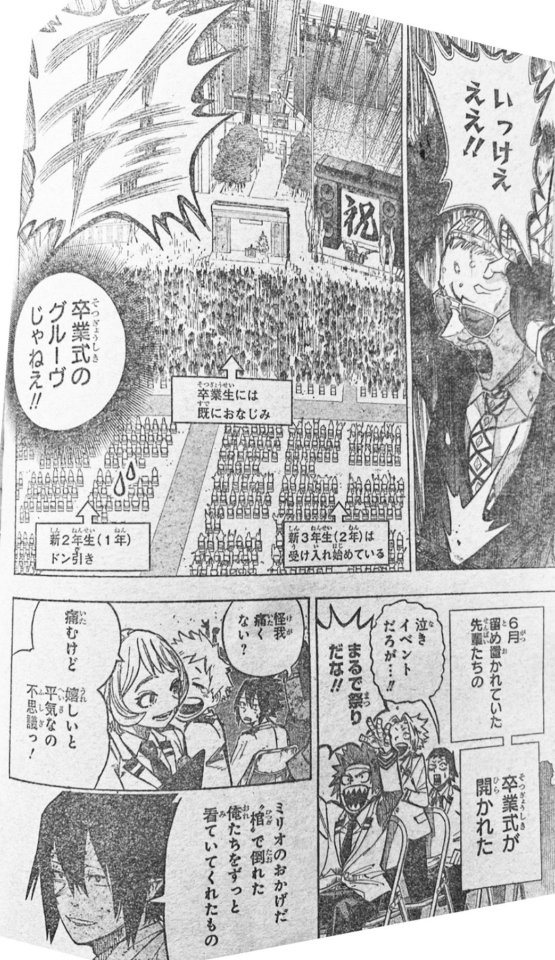
1 いっけえええ‼︎ ikkeeee!! "Let's go!!"
2 イエエエアアア IEEEAAA "YEEEAAAHHH!"
3 卒業式のグルーヴじゃねえ‼︎ そつぎょうしきのグルーヴじゃねえ‼︎ sotsugyoushiki no GURUUVU ja nee!! This isn't a groove for a graduation ceremony!!
4 卒業生には既におなじみ そつぎょうせいにはすでにおなじみ sotsugyou-sei ni wa sude ni onajimi The graduates are already familiar with this.
5 新3年生(2年)は受け入れ始めている しん3ねんせい(2ねん)はうけいれはじめている shin 3nensei (2nen) wa ukeire hajimete iru The new 3rd-year students (second years) are beginning to accept it.
6 新2年生(1年)ドン引き しん2ねんせい(1ねん)ドンびき shin 2nensei (1nen) DONbiki The mood is ruined for the new 2nd year students (first years).
7 6月留め置かれていた先輩たちの 6がつとめおかれていたせんぱいたちの 6gatsu tomeokarete ita senpai-tachi no For the seniors who were kept until June,
8 卒業式が開かれた そつぎょうしきがひらかれた sotsugyoushiki ga hirakareta a graduation ceremony was held.
9 泣きイベントだろが…‼︎ なきイベントだろが…‼︎ naki IBENTO daro ga...!! "This is an event for crying, though...!!"
10 まるで祭りだな‼︎ まるでまつりだな‼︎ maru de matsuri da na!! "It's like a festival, huh!!"
11 怪我痛くない? けがいたくない? kega itakunai? "Don't your injuries hurt?"
12 痛むけど いたむけど itamu kedo "They hurt, but"
13 嬉しいと平気なの不思議っ! うれしいとへいきなのふしぎっ! ureshii to heiki na no fushigi! "it's strange, I'm all happy and fine!"
14 ミリオのおかげだ"棺"で倒れた俺たちをずっと看ていてくれたもの ミリオのおかげだ"ひつぎ"でたおれたおれたちをずっとみていてくれたもの MIRIO no okage da "hitsugi" de taoreta ore-tachi wo zutto mite ite kureta mono "It's thanks to Mirio. He was the one who kept looking after us when we collapsde in the 'coffin.'"
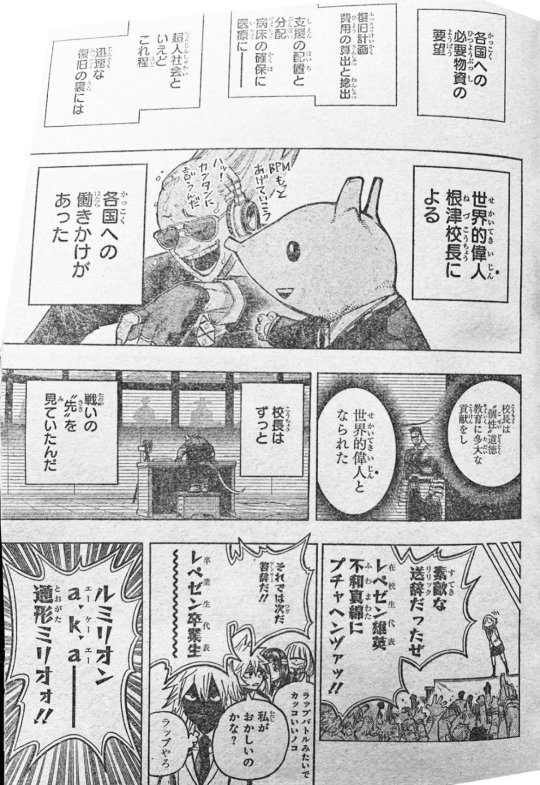
1 各国への必要物資の要望 かっこくへのひつようぶっしのようぼう kakkoku e no hitsuyou busshi no youbou Requests for necessary supplies to each country,
2 復旧計画費用の算出と捻出 ふっきゅうけいかくひようのさんしゅつとねんしゅつ fukkyuu keikaku hiyou no sanshutsu to nenshutsu calculating and raising recovery plan costs,
3 支援の配置と分配病床の確保に医療にーーー しえんのはいちとぶんぱいびょうしょうのかくほにいりょうにーーー shien no haichi to bunpai byoushou no kakuho ni iryou ni--- placement and distrbution of support, securing of hospital beds, medical care---
4 超人社会といえどこれ程 ちょうじんしゃかいといえどこれほど choujin shakai to iedo kore hodo although it may be called a superhuman society,
5 迅速な復旧の裏には じんそくなふっきゅうのうらには jinsoku na fukkyuu no ura ni wa the one behind the speedy recoevery was
6 世界的偉人根津校長による せかいてきいじんねづこうちょうによる sekai-teki ijin Nedzu-kouchou ni yoru the world-famous Principal Nedzu
small text 1 BPMもっとあげていこう BPM motto agete ikou Let's increase the BPM more.
small text 2 ハッ!カンタンに言うんだ ハッ!カンタンにいうんだ HA! KANTAN ni iunda Ha! You gotta say it simply.
7 各国への働きかけがあった かっこくへのはたらきかけがあった kakkoku e no hataraki kake ga atta and his efforts to reach out to each country.
8 校長は"個性"道徳教育に多大な貢献をし こうちょうは"こせい"どうとくきょういくにただいなこうけんをし kouchou wa "kosei" doutoku kyouiku ni tadai na kouken wo shi The principle made great contributions to quirk morality education
9 世界的偉人となられた せかいてきいじんとなられた sekai-teki ijin to narareta and became a world-famous figure.
10 校長はずっと こうちょうはずっと kouchou wa zutto The principal was always
11 戦いの"先"を見ていたんだ たたかいの"さき"をみていたんだ tatakai no "saki" wo mite itanda looking ahead to what came after the battle.
12 素敵な送辞だったぜ すてきなリリックだったぜ suteki na RIRIKKU (kanji: souji) datta ze "What lovely lyrics (read as: farewell address)."
13 レペゼン雄英不和真綿にプチャヘンヅァッ‼︎ 在校生代表ふわまわたにプチャヘンヅァッ‼︎ sotsugyousei daihyou (kanji REPEZEN yuuei) Fuwa Mawata ni PUCHAHENDZA!! "Put your hands up for current student representative (read as: UA representative) Mawata Fuwa!!"
14 それでは次だ答辞だ‼︎ それではつぎだアンサーだ‼︎ sore de wa tsugi da ANSAA da!! "After that is the answering speech (kanji: formal reply)!!"
15 レペゼン卒業生〜〜〜〜〜 卒業生代表〜〜〜〜〜 sotsugyousei daihyou (kanji: REPEZEN sotsugyousei) "From the alumni representative (read as: graduate students representative)~~~~~"
16 ラップバトルみたいでカッコいいノコ RAPPU BATORU mitai de KAKKOii NOKO "It's like a rap battle, so cool, shroom!"
17 私がおかしいのかな? わたしがおかしいのかな? watashi ga okashii no ka na? "Am I the weird one?"
18 ラップやろ RAPPU yaro Let's rap.
19 ルミリオンa.k.aーーー通形ミリオォ‼︎ ルミリオンエーケーエーーーーとお��たミリオォ‼︎ RUMIRION EE KEE EE---Toogata MIRIOO!! "Lemillion a.k.a.----Mirio Toogata!!"
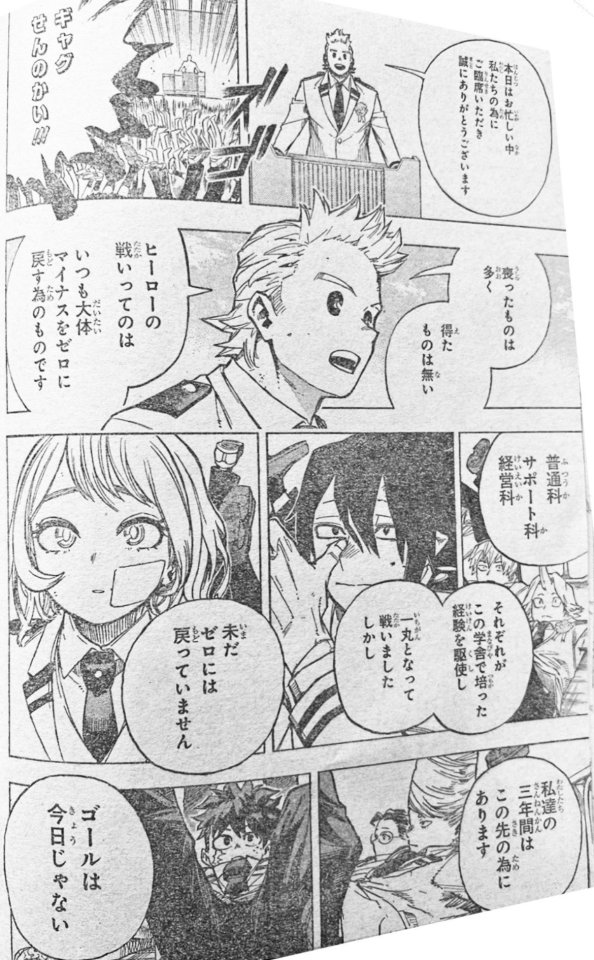
1 本日はお忙しい中私たちの為にご臨席いただき誠にありがとうございます ほんじつはおいそがしいなかわたしたちのためにごりんせきいただきまことにありがとうございます honjitsu wa oisogashii naka watashi-tachi no tame ni gorinseki itadaki makoto ni arigatou gozaimasu "Thank you very much for taking time out of your busy schedules to attend for us today."
2 ギャクせんのかい!!! GYAKU sen no kai!!! "It's the opposite of what we expected!!!" (Note: "Sen no kai" is something said in a call and response when the caller expects the repsonders to do something but they don't do what they were expected to do. When that happens, the caller says this phrase as a joke.)
3 喪ったものは多く うしなったものはおおく ushinatta mono wa ooku "We lost many things,"
4 得たものは無い えたものはない eta mono wa nai "but we gained nothing."
5 ヒーローの戦いってのは ヒーローのたたかいってのは HIIROO no tatakai tte no wa "A hero's battle"
6 いつも大体マイナスをゼロに戻す為のものです いつもだいたいマイナスをゼロにもどすためのものです itsumo daitai MAINASU wo ZERO ni modosu tame no mono desu "is always for the sake of returning the negatives to zero on the whole."
7 普通科サポート科経営科 ふつうかサポートかけいえいか futsuu-ka SAPOOTO-ka keien-ka "The general studies course, the support course, the business course,"
8 それぞれがこの学舎で培った経験を駆使し それぞれがこのまなびやでつちかったけいけんをくしし sorezore ga kono manabiya de tsuchikatta keiken wo kushi shi "each of us made full use of the experience we had cultivated at this school,"
9 一丸となって戦いましたしかし いちがんとなってたたかいましたしかし ichigan to natte tatakaimashita shikashi "and we fought as one. However,"
10 未だゼロには戻っていません いまだゼロにはもどっていません ima da ZERO ni wa modotte imasen "we haven't returned to zero yet."
11 私達の三年間はこの先の為にあります わたしたちのさんねんかんはこのさきのためにあります watashi-tachi no sannenkan wa kono saki no tame ni arimasu "Our three years are for what comes after this."
12 ゴールは今日じゃない ゴールはきょうじゃない GOORU wa kyou ja nai "The goal is not today."
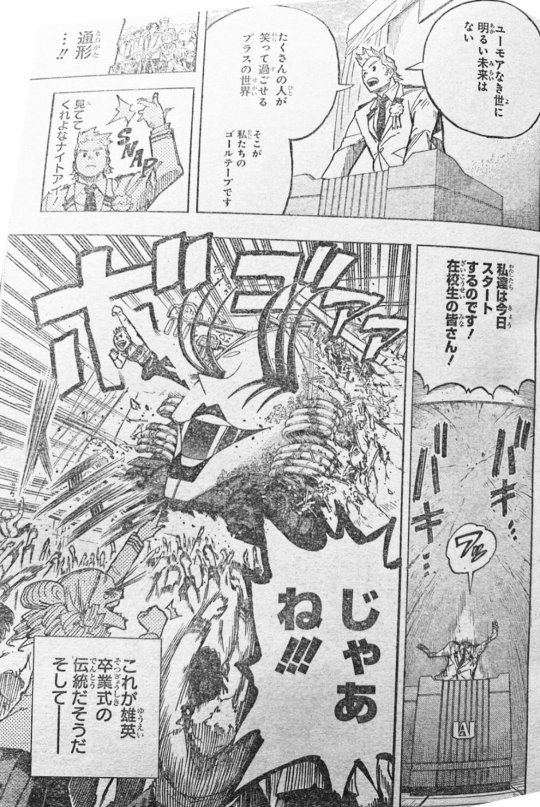
1 ユーモアなき世に明るい未来はない ユーモアなきよにあかるいみらいはない YUUMOA naki yo ni akarui mirai wa nai "There is no bright future in a world without humor."
2 たくさんの人が笑って過ごせるプラスの世界 たくさんのひとがわらってすごせるプラスのせかい takusan no hito ga waratte sugoseru PURASU no sekai "A world of positives, where many people can laugh and spend time together,"
3 そこが私たちのゴールテープです そこがわたしたちのゴールテープです soko ga watashi-tachi no GOORU TEEPU desu "that is our finish line."
4 通形…‼︎ とおがた…‼︎ Toogata...!! "Toogata...!!"
5 見ててくれよなナイトアイ! みててくれよなナイトアイ! mitete kure yo NAITOAI! Please be watching, Nighteye!
6 私達は今日スタートするのです!在校生の皆さん! わたしたちはきょうスタートするのです!ざいこうせいのみなさん! watashi-tachi wa kyou SUTAATO suru no desu! zaikousei no minasan! "Today is our start! All of you current students!"
7 じゃあね!!! jaa ne!!! "See ya!!!"
8 これが雄英卒業式の伝統だそうだそしてーー これがゆうえいそつぎょうしきのでんとうだそうだそしてーー kore ga yuuei sotsugyoushiki no dentou da sou da soshite-- Apparently this is the tradition of the UA graduation ceremony, and--

1 例年なら担任は持ち��がりじゃないんだが れいねんならたんにんはもちあがりじゃないんだが reinen nara tannin wa mochiagari ja nainda ga "In a normal year, I wouldn't be asked to be the homeroom teacher, but,"
2 まァ事情がもう一年よろしく まァじじょうがもういちねんよろしく maA jijou ga mou ichinen yoroshiku "well, I hope things stay the same for another year."
3 よかったああ yokattaaa "Thank goodness!"
4 相澤先生がうれしいよお あいざわせんせいがうれしいよお Aizawa-sensei ga ureshii yoo "I'm so happy it's Aizawa-sensei!"
5 泣いちゃった ないちゃった naichatta "Oh dear, she cried."
6 相澤先生でよかったああ あいざわせんせいでよかったああ Aizawa-sensei de yokattaaa "I'm glad it's Aizawa-sensei!"
7 これで一段落か これでいちだんらくか kore de ichidanraku ka "With this, are we at a stopping point?"
8 おまえ入院してなくていいの? おまえにゅういんしてなくていいの? omae nyuuin shitenakute ii no? "Don't you have to be hospitalized?"
9 安静にしてりゃいいってよ今日は全員そろってなきゃダメだろ あんせいにしてりゃいいってよきょうはぜんいんそろってなきゃダメだろ ansei ni shiterya ii tte yo kyou wa sen'in sorottenakya DAME daro "They said it's okay if I rest, we all gotta be together today."
10 まともなこと言いだしたぞ まともなこといいだしたぞ matomona koto ii dashita zo "Hey, you said something reasonable."
11 あぁ⁉︎ aa!? "Hah!?"
12 安静に…! あんせいに…! ansei ni...! "Rest...!"
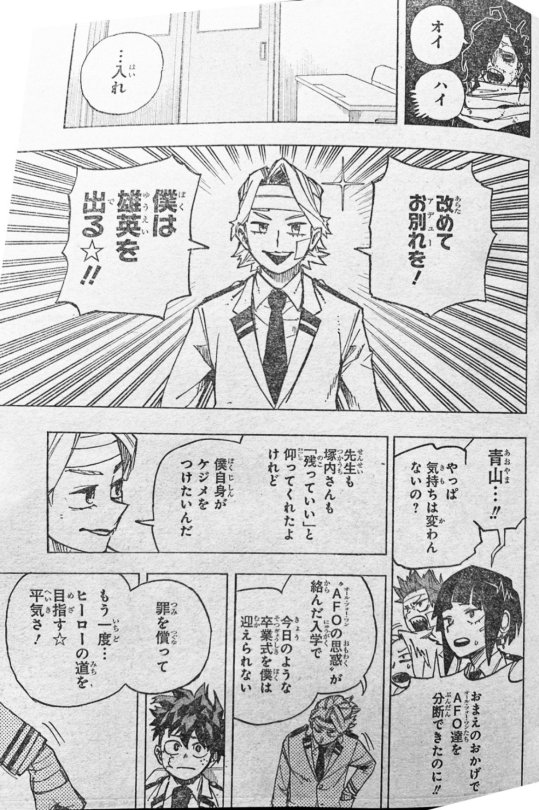
1 オイ OI "Hey!"
2 ハイ HAI "Yessir."
3 …入れ …はいれ ...haire "...Come in."
4 改めてお別れを! あらためてアデューを! aratamete ADEYUU (kanji: owakare) wo! "Once again, adieu!"
5 僕は雄英を出る☆‼︎ ぼく��ゆうえいをでる☆‼︎ boku wa yuuei wo deru ☆!! "I'm leaving UA ☆!!"
6 青山…‼︎ あおやま…‼︎ Aoyama...!! "Aoyama...!!"
7 やっぱ気持ちは変わんないの? やっぱきもちはかわんないの? yappa kimochi wa kawannai no? "Are you sure your feelings won't change?"
8 おまえのおかげでAFO達を分断できたのに‼︎ おまえのおかげでオール・フォー・ワンたちをぶんだんできたのに‼︎ omae no okage de OORU FOO WAN-tachi wo bundan dekita noni!! "But thanks to you, we were able to divide All For One and all of them!!"
9 先生も塚内さんも「残っていい」と仰ってくれたよけれど せんせいもつかうちさんも「のこっていい」とおっしゃってくれたよけれど sensei mo Tsukauchi-san mo 「nokotte ii」 to osshatte kureta yo keredo "Both Sensei and Tsukauchi-san told me it was okay for me to say, but"
10 僕自身がケジメをつけたいんだ ぼくじしんがケジメをつけたいんだ boku jishin ga KEJIME wo tsuketainda "I myself want to take responsibility."
11 "AFOの思惑"が絡んだ入学で "オール・フォー・ワンのおもわく"がからんだにゅうがくで "OORU FOO WAN no omowaku" ga karanda nyuugaku de "My admission was entagled with All For One's predictions,"
12 今日のような卒業式を僕は迎えられない きょうのようなそつぎょうしきをぼくはむかえられない kyou no you na sotsugyoushiki wo boku wa mukaerarenai "I cannot receive a graduation ceremony like the one today."
13 罪を償って つみをつぐなって tsumi wo tsugunatte "I'll atone for my sins,"
14 もう一度…ヒーローの道を目指す☆平気さ! もういちど…ヒーローのみちをめざす☆へいきさ! mou ichido...HIIROO no michi wo mezasu ☆ heiki sa! "and once again...I'll aim for the path of a hero ☆ I'll be fine!"
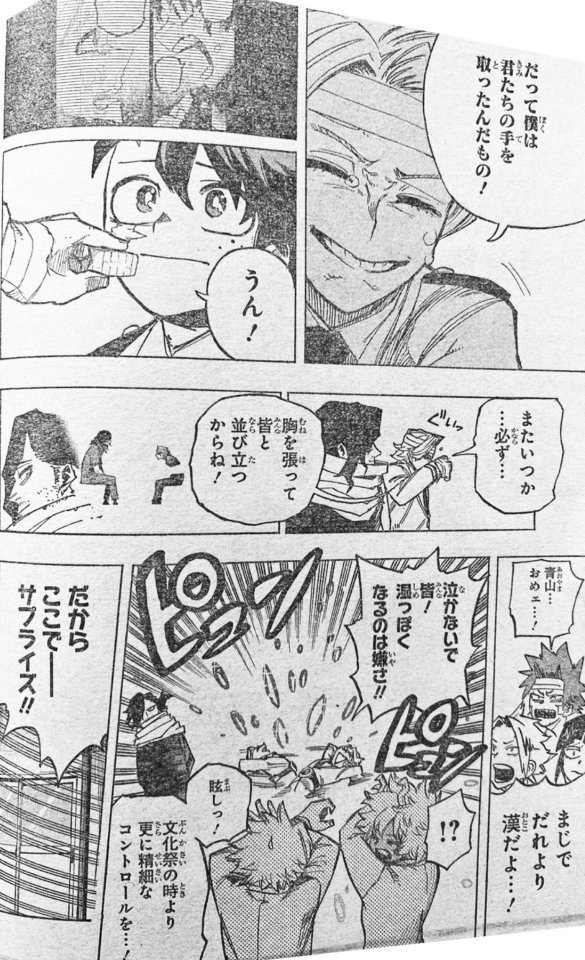
1 だって僕は君たちの手を取ったんだもの! だってぼくはきみたちのてをとったんだもの! datte boku wa kimi-tachi no te wo tottanda mono! "After all, I took all of your hands!"
2 うん! un! "Yeah!"
3 またいつか…必ず… またいつか…かならず… mata itsuka...kanarazu... "Someday again...for sure..."
4 胸を張って皆と並び立つからね! むねをはってみんなとならびたつからね! mune wo hatte minna to narabitatsu kara ne! "I'll stand alongside everyone with my chest puffed with pride!"
5 青山…おめェ…! あおやま…おめェ…! Aoyama...omeE...! "Aoyama...you...!"
6 まじでだれより漢だよ まじでだれよりおとこだよ maji de dare yori otoko da yo "Seriously, you're more manly than anyone."
7 泣かないで皆!湿っぽくなるのは嫌さ‼︎ なかないでみんな!しめっぽくなるのはいやさ‼︎ nakanaide minna! shimeppoku naru no wa iya sa!! "Don't cry, everyone! It would be terrible for things to become damp!!"
8 眩しっ! まぶしっ! mabushi! "Dazzling!"
9 文化祭の時より更に精細なコントロールを…! ぶんかさいのときよりさらにせいさいなコントロールを…! bunkasai no toki yori sara ni seisai na KONTOROORU wo...! "Even more precise control than during the cultural festival...!"
10 だからここでーーサプライズ‼︎ dakara koko de--SAPURAIZU!! "And so here's a---surprise!!"

1 A組の新メンバーさ‼︎ エーぐみのしんメンバーさ‼︎ EE-gumi no shin MENBAA sa!! "The new member of Class A!"
2 心操ォオオ‼︎ しんそォオオ‼︎ ShinsoOOO!! "Shinsou!!"
3 わ wa "Wah!"
4 A組に来たかあ! エーぐみにきたかあ! EE-gumi ni kita kaa! "Did you come to Class A!"
5 編入だあA組なんだあ! へんにゅうだあエーぐみなんだあ! hennyuu daa EE-gumi nandaa! "You transferred! To Class A!"
6 すげえー‼︎仮免は正式発行されたの⁉︎ すげえー‼︎かりめんはせいしきはっこうされたの⁉︎ sugeee!! karimen wa seishiki hakkou sareta no!? "Awesome!! Did they officially issue your provisional license!?"
7 送別会とかの話題になってもよくない⁉︎ そうべつかいとかのわだいになってもよくない⁉︎ soubetsukai toka no wadai ni nattemo yokunai!? "Is it not good to bring up the subject of a farewell party!?"
8 たしかに tashika ni "Surely."
9 わ!青山くん わ!あおやまくん wa! Aoyama-kun "Wah! Aoyama-kun,"
10 ストップ!ストップ! SUTOPPU! SUTOPPU! "stop! Stop!"
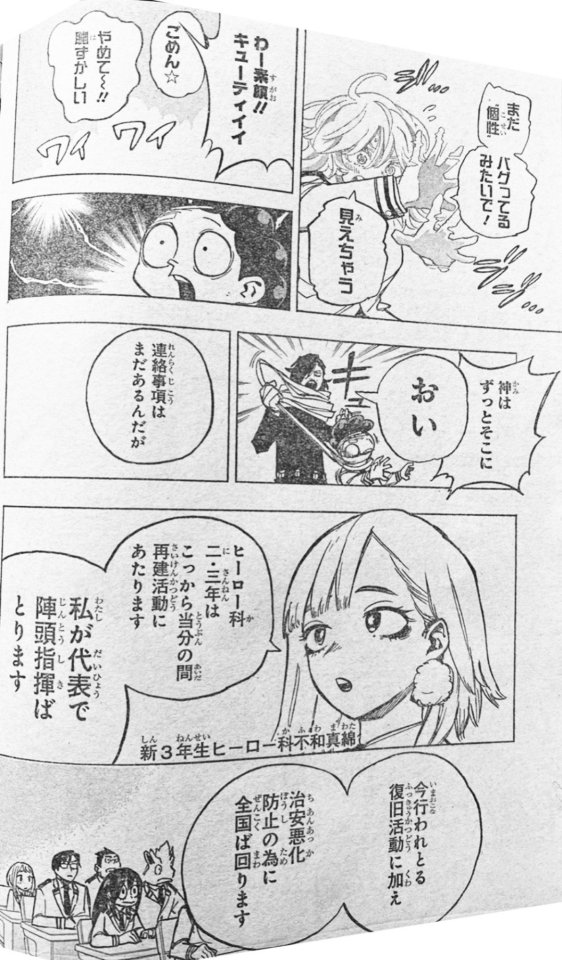
1 まだ"個性" まだ"こせい" mada "kosei" "My quirk is still"
2 バグってるみたいで! BAGUtteru mitai de! "bugging out, it looks like!"
3 見えちゃう みえちゃう miechau "You can see me!"
4 わー素顔‼︎キュウティイイ わーすがお‼︎キュウティイイ waa sugao!! KYUUTIII "Wow, her real face!! A cutieee!"
5 ごめん☆ gomen ☆ "Sorry ☆"
6 やめて〜‼︎恥ずかしい やめて〜‼︎はずかしい yamete~!! hazukashii "Quit it~!! It's embarrassing!"
7 神はずっとそこに かみはずっとそこに kami wa zutto soko ni "A god was always right there."
8 おい oi "Hey."
9 連絡事項はまだあるんだが れんらくじこうはまだあるんだが renraku jikou wa mada arunda ga "There are still announcements."
10 ヒーロー科二・三年はこっから当分の間再建活動にあたります ヒーロー科に・さんねんはこっからとうぶん��あいださいけんかつどうにあたります HIIROO-ka ni・sannen wa kokkara toubun no aida saiken katsudou ni atarimasu "The second- and third-year students of the hero course for the time being will be involved in rebuilding activities."
11 私が代表で陣頭指揮ばとります わたしがだいひょうでじんとうしきばとります watashi ga daihyou de jintoushiki ba torimasu "I, as representative, will take the lead."
small text 新3年生ヒーロー科不和真綿 しん3ねんせいヒーローかふわまわた shin 3nensei HIIROO-ka Fuwa Mawata New third-year student of the hero course, Mawata Fuwa
12 今行われとる復旧活動に加え いまおこなわれとるふっきゅうかつどうにくわえ ima okonaware toru fukkyuu katsudou ni kuwae "In addition to the ongoing recoery efforts,"
13 治安悪化防止の為に全国ば回ります ちあんあっかぼうしのためにぜんこくばまわります chian akka boushi no tame ni zenkoku ba mawarimasu "we will be traveling around the country to prevent the deterioration of public order."
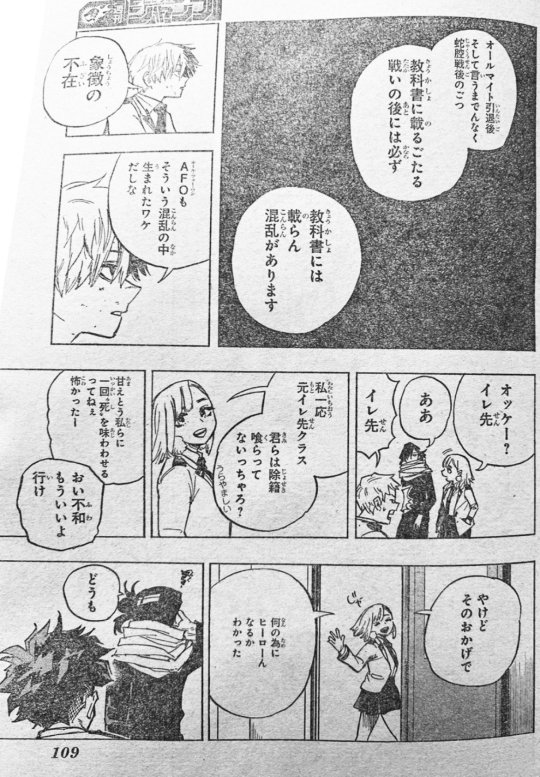
1 オールマイト引退後そして言うまでんなく蛇腔戦後のごつ オールマイトいんたいごそしていうまでんなくじゃくうせんごのごつ OORU MAITO intaigo soshite iu maden naku jakuu sengo no gotsu "After All Might's retirement and, needless to say, after the battle at Jakuu,"
2 教科書に載るごたる戦いの後に必ず きょうかしょにのるごたるたたかいのあとにかならず kyoukasho ni noru gotaru tatakai no ato ni kanarazu "after the battles that apppear in textbooks,"
3 教科書に載らん混乱があります きょうかしょにのらんこんらんがあります kyoukasho ni noran konran ga arimasu "there is always confusion that does not appear in the textbooks."
4 象徴の不在 しょうちょうのふざい shouchou no fuzai "The absence of a symbol."
5 AFOもそういう混乱の中生まれたウケだしな オール・フォー・ワンもそういうこんらんのなかうまれたウケだしな OORU FOO WAN mo sou iu konran no naka umareta UKE dashi na "AFO was also born out of such turmoil."
6 オッケー?イレ先 オッケー?イレせん OKKEE? IRE-sen "Okay? Era-sen?"
7 ああ aa "Yes."
8 イレ先 イレせん IRE-sen "Era-sen!"
9 私一応元イレ先クラス わたしいちおうもとイレせんクラス watashi ichiou moto IRE-sen KURASU "I used to be in Era-sen's class."
10 君らは除籍喰らってないっちゃう? きみらはじょせきくらってないっちゃう? kimira wa joseki kurattenaicchau? "You guys haven't undergone his expulsion?"
small text うらやましい urayamashii "I'm jealous."
11 甘えとう私らに一回"死"を味わわせるってねぇ怖かったー あまえとうわたしらにいっかい"し"をあじわわせるってねぇこわかったー amaetou watashira ni ikkai "shi" wo ajiwwaseru tte nee kowakattaa "We were so naive, he said he'd make us taste 'death' once, right? It was scary."
12 おい不和もういいよ行け おいふわもういいよいけ oi Fuwa mou ii yo ike "Hey Fuwa, enough, go."
13 やけどそのおかげで yakedo sono okage de "But thanks to that,"
14 何の為にヒーローんなるかわかった なんのためにヒーローんなるかわかった nan no tame ni HIIROO n naru ka wakatta "I understood for what reason to become a hero."
15 どうも doumo "Thanks."
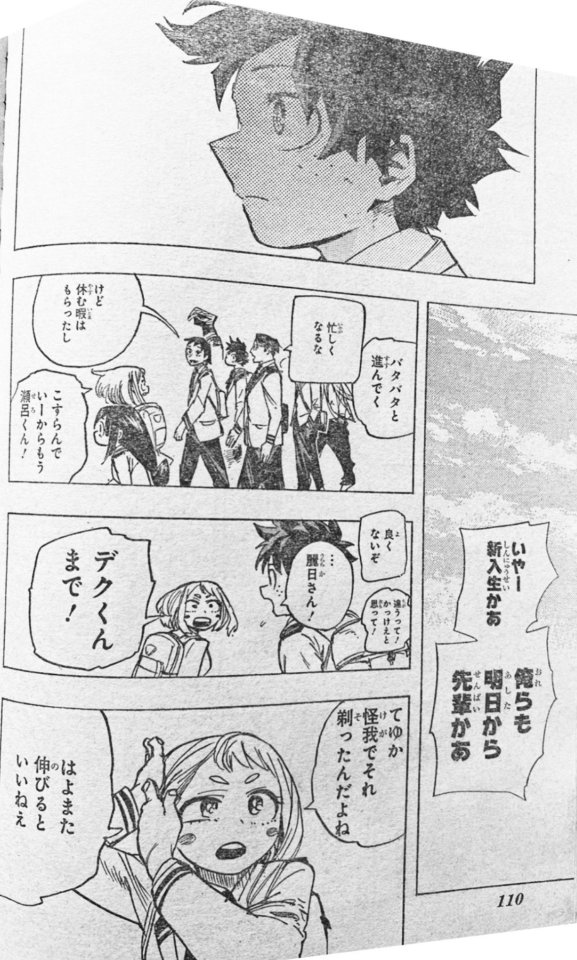
1 いやー新入生かあ いやーしんにゅうせいかあ iyaa shinnyuusei kaa "Wow, new incoming students huh?'
2 俺らも明日から先輩かあ おれらもあしたからせんぱいかあ orera mo ashita kara senpai kaa "Are we also senpai after tomorrow?"
3 バタバタと進んでく バタバタとすすんでく BATABATA to susundeku "We'll progress to being busy."
4 忙し��なるな いそがしくなるな isogashiku naru na "We will become busy, huh."
5 けど休む暇はもらったし けどやすむいとまはもらったし kedo yasumu itoma wa moratta shi "But we got some free time to rest."
6 こすらんでいーからもう瀬呂くん! こすらんでいーからもうせろくん! kosurande ii kara mou Sero-kun! "You don't need to rub it in, Sero-kun, geez!"
7 良くないぞ よくないぞ yokunai zo "That's no good."
8 違うって!かっけえと思って! ちがうって!かっけえとおもって! chigau tte! kakkee to omotte! "No! I think it's cool!"
9 …麗日さん! …うららかさん! ...Uraraka-san! "...Uraraka-san!"
10 デクくんまで! DEKU-kun made! "Even you, Deku-kun!"
11 てゆか怪我でそれ剃ったんだよね てゆかけがでそれそったんだよね te yuka kega de sore sottanda yo ne "You shaved that due to an injury, right?"
12 はよまた伸びるといいねえ はよまたのびるといいねえ wa yo mata nobiru to ii nee "I hope it grows again soon."

1 イメチェンといや常闇だよ イメチェンといやとこやみだよ IMECHEN to iya Tokoyami da yo "I don't want a change of image, that's Tokoyami."
2 違うが気に入ってる ちがうがきにいってる chigau ga ki ni itteru "It's different, but I'm taking a liking to it."
3 ハッ HA "Hah" (Note: This is the sound of panting.)
4 ハッ HA "Hah"
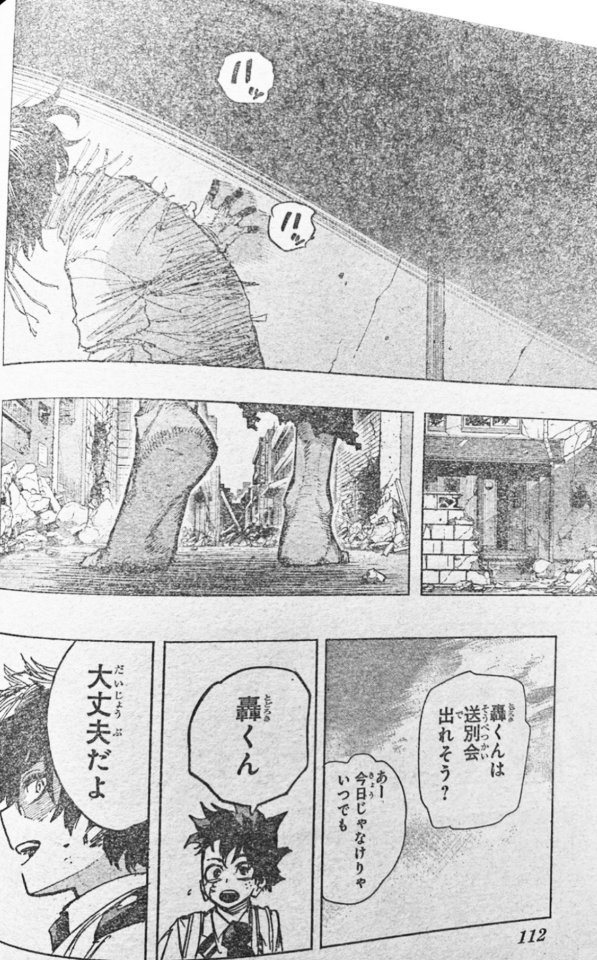
1 ハッ HA "Hah" (Note: This is the sound of panting.)
2 ハッ HA "Hah"
3 轟くんは送別会出れそう? とどろきくんそうべつかいでれそう? Todoroki-kun soubetsu-kai deresou? "Todoroki-kun, will you be able to attend the farewell party?"
4 あー今日じゃなけりゃいつでも あーきょうじゃなけりゃいつでも aa kyou ja nakerya itsudemo "Yeah, so long as it's not today, anytime [works]."
5 轟くん とどろきくん Todoroki-kun "Todoroki-kun."
6 大丈夫だよ だいじょうぶだよ daijoubu da yo "I'm okay."
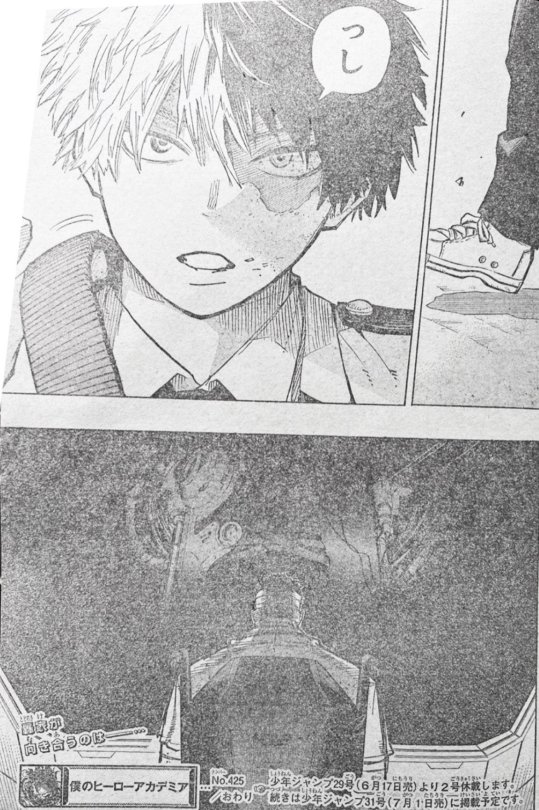
1 っし sshi (Note: I'm not sure what this means or if it even means anything. It could just be a wordless sound like a sigh or a tongue click.)
tagline 轟家が向き合うのはーー… とどろきけがむきあうのはーー… Todoroki-ke ga mukiau no wa--... What the Todoroki family will face--...
#my hero academia leak translations#mha 425#bnha 425#my hero academia manga spoilers#epilogue arc spoilers
335 notes
·
View notes
Text
TRANSLATION ERROR: HOW DO HALF-FOOT NAMES WORK?
So, there are several translation issues in the official English release of Dungeon Meshi. One of them is the information about how half-foot names work.
Original text: 名前と後名・父親の名前の前名+スあるいはズで構成する。チルチャックを例に挙げると、前名 (チル)+後名 (チャック)・父親の名前 (ティム)+ズ。チルチャックの娘のファミリーネームは“チルズ” か “チルス”となる。なお、前名だけ呼ぶのは親しい間柄だけである。 Official translation: Names are composed of a first name, a last name, and their father’s first name plus “s” or “z.” For example, Chilchuck’s first name is “Chil,” his last name is “Chuck,” and his father’s name is “Tim”+s. Chilchuck’s daughters’ family names are either “Chilz” or “Chils.” Only people who are very close to an individual call them by their first name on its own. Machine translation, confirmed by a human translator: It is composed of the first name, the second name, the first name of the father, and then either "u" or "z". For example, Chilchuck's first name is "Chill" + "second name" (Chuck) + "father's name" (Tim) + "s". The family name of Chilchuck's daughter is "Chilz" or "Chils". Only close friends call each other by their first name.
In Japanese, first/personal/given names are called mei (名, name) or shita no namae (下の名前, lower name). Family name/last name/surname can translate into three different Japanese words, myōji (苗字), uji (氏), and sei (姓).
The original Japanese text doesn’t use any of these standard words for first or last name at all, most likely to try and avoid exactly this confusion.
For Chilchuck, it uses 前名 (“before” + “name”) and 後名 (“back” + “name”), which are not normally used in Japanese to refer to a person’s personal name and family name, and when used together like this implies a two-part personal name (Chilchuck).
So Yen Press incorrectly states that “Chuck” is Chilchuck’s last name when the Japanese says 後名 (back name), and then correctly translates that his daughters’ family name (ファミリーネーム, family name written phonetically in katakana) is Chilz/Chils.
Kui most likely purposefully used the katakana phrase “family name” to make sure people understood that when she called Chuck his back name (後名), she did not mean last name/surname/family name.
So this caption should have been translated as something like:
“Half-foot names are composed of a personal name, which is made of a first part and a second part, followed by their family name, which is their father’s first name plus “s” or “z.”
Something that would have made this much easier to translate would be if Kui had called Tims and Chilz/Chils patronymics, which is the real world terminology for the type of name she's describing. As it is, the translators probably weren't familiar with patronyms and didn't recognize what Kui was talking about, and didn't proof-read their work sufficiently to catch that their translation was confusing and misleading.
A patronym is a name based on the personal name of one's father, grandfather, or an earlier male ancestor. Traditional patronymics like this change with every generation, which is what Kui describes the half-foots doing.
Over time a patronym sometimes gets “stuck” and becomes a hereditary patronymic surname instead of just a patronym. For example, the hereditary name Johnson originally meant that someone was the son of John, but the name became a fixed, hereditary surname, and now every generation of the family is called Johnson, no matter what their father’s personal name was.
If the half-foots had patronymic surnames/last names/family names, then Chilchuck's daughters would also be named Tims, but they're not, so we know that the last part of their names are actually just traditional patronymics.
So which part of Chilchuck Tims’ name is his last name/family name/surname?
Though it's really not a last name, Chilchuck's patronymic, Tims, functions the same way as a hereditary surname would function for someone else. Tims is the patronymic that he inherited from his father’s first name, which was Tim. It’s the name that connects him to his father and shows that they are related. For his daughters, their patronymic is Chilz/Chils, the name they inherited from Chilchuck, and that shows that they are related.
BONUS
Half-foot culture appears to be predominately Irish and Hebrew. This is interesting, because Irish is a Gaelic culture. Welsh is another Gaelic culture, and the way Welsh patronymic surnames developed is similar to Kui's half-foot naming system.
Historical Welsh names sometimes included references to several generations: e.g., Llywelyn ap Gruffydd ap Morgan (Llywelyn son of Gruffydd son of Morgan), and which gave rise to the quip, "as long as a Welshman's pedigree."
During the Anglicization process, ap Gruffydd was turned into Gruffydds; i.e., the "ap" meaning "son of" was replaced by the genitive suffix "-s", but there are also cases like "ab/ap Evan" being turned into "Bevan."
In some cases the "ap" coalesced into the name in some form, like ab Rhydderch becoming Broderick, ap Rhys becoming Price, and ap John becoming Upjohn.
(This is an excerpt from my essay on real world cultural and linguistic references in Dungeon Meshi. See chapter 8 for more information about Chilchuck and his daughter's names, and the real world influences in half-foot culture.)
#dungeon meshi#delicious in dungeon#chilchuck tims#chilchuck#meijack#puckpatti#flertom#dandan#chilchuck's wife#The Essay#PSA
138 notes
·
View notes
Note
Do you have any genderweird manga recs? Bonus points if it's genderweird And yuri
Stuff I read relatively recently:
Magitora まじとら / Otoko Tomodachi Girl 男友達ガール Shishunki Bitter Change 思春期ビターチェンジ Ore ga Watashi ni Naru Made オレが私になるまで The Guy She Was Interested in Wasn't a Guy At All 気になってる人が男じゃなかった (this one's mostly just yuri) While Cross-Dressing I Was Hit on by a Handsome Guy イケメン女子と女装男子 We are Former Girls 私たちは元女の子です Unparalleled Mememori-Kun 目々盛くんには敵わない (I actually had to look up the english name for this one. For some reason I thought it was called The Amazing Mememori-kun) Sakura-chan and Amane-kun さくらちゃんとあなめくん / Zenbu Kimi no Sei ぜんぶきみの性 Genshiken げんしけん / Genshiken Nidaime げんしけん二代目 Bokura no Hentai ぼくらのへんたい Danshikou ni Dokusareta Otokonoko 男子校に毒された男の娘
Honourable mention: Fire Punch (just go read it. seriously.)
Not-so-honourable mentions: I Think I Turned My Childhood Friend into a Girl 恋する(おとめ)の作り方 Senpai wa Otokonoko 先輩はおとこのこ
(not an exhaustive list by any means. you can help by expanding it)
175 notes
·
View notes
Text
Memo for Season 2 Ep.1 (Ep.25), The Apothecary Diaries
Here I’ll write about things I noticed, questions, and thoughts about each episode. I’m not sure if I can write about every episode, but I’d like to write as long as I have time. Most of what I write here is my personal opinion, so please forgive me if there are any misunderstandings. Questions about English are highlighted in green, so I would be happy if anyone of a native English speaker could tell me. I would also be happy if you would feel free to reply with your own thoughts and opinions.
猫猫「何をと言われましても。香油を作っております。医局を掃除していて、蒸留装置を見つけたので。先日、青薔薇(そうび)を作る際に用意した薔薇の余りです」
Maomao “Nani’o-to iware-mashitemo, koyu’o tsukutte-orimasu. Ikyoku’o soji-shite-ite, joryu-sochi’o mitsuketa-node. Senjitsu, ao-sobi’o tsukuru-saini yoi-shita sobino amari desu.”
Maomao “Why do you ask like that? I’m making scented oils. While cleaning up the clinic, I found a still. I’m using some of the blooms left over from the blue roses we grew the other day.”
何をと言われましても(なにをといわれましても/Nani’o-to iware-mashitemo);
This is a phrase Maomao sometimes uses, which literally means “Even if you ask me that…,” followed by words such as “it’s hard to explain,” “I’m in trouble,” or “you should know without asking,” and only the first half is said because she is hesitant to say the whole sentence. If you say it when asked something, it sounds sarcastic because it contains the nuance that you don’t want to answer soon. In Maomao’s case, she seems to say it when she is wondering “Why do you ask me that?” or “It’s troublesome to answer,” or when she is trying to buy time while wondering what to say when asked something inconvenient.
ーーーーーーーーーーーーーーーーーーーーーーーーーーーーーーー
猫猫「うわっ!これは実家からの荷物で、大したものではありませんので」
Maomao “Uwa! Korewa jikka-karano nimotsude, taishita mono-dewa ari-masen-node.”
Maomao “This is a package from my family. It’s nothing, really!”
実家(じっか/Jikka): Parents’ house
There is no such word in English, but in Japanese we use it all the time. For example, 「今週末は実家に帰る予定だ(こんしゅうまつは、じっかにかえるよていだ/Kon-shumatsuwa jikkani kaeru yoteida)」:“I’m planning on going back to my parents’ house this weekend,” and we say 「帰る(かえる/Kaeru)」: “going back” instead of 「行く(いく/Iku)」: “going to.”
ーーーーーーーーーーーーーーーーーーーーーーーーーーーーーーー
猫猫「後宮で問題なのは、性的に無垢(むく)なことが求められ過ぎていることです。後宮に集められる女官は、生娘(きむすめ)がほとんどです。帝のお眼鏡にかなったとして、無知なために粗相があったりしたら、不憫(ふびん)でなりません。事前に学習する必要があるかと」
Maomao “Kokyude mondai-nanowa, sei-tekini mukuna kotoga motome-rare-sugite-iru-koto desu. Kokyuni atsume-rareru nyokanwa, kimusumega hotondo desu. Mikadono omeganeni kanatta-to-shite, muchina tameni sosoga attari-shitara, fubinde nari-masen. Jizenni gakushu-suru hitsuyoga aru-kato.”
Maomao “The problem with the rear palace is that the women are expected to be excessively innocent in matters of sex. Most of the ladies-in-waiting gathered here are virgins. What if the emperor finds a girl to his liking, only to have her fail to perform due to her ignorance? That’s why I thought they need to be educated beforehand.”
生娘(きむすめ/Kimusume): virgin
This is an old word, so young Japanese such as teenagers probably don’t know. We usually use 「処女(しょじょ/Shojo)」 for “virgin,” although we don’t say such a word loudly, of course…
ーーーーーーーーーーーーーーーーーーーーーーーーーーーーーーー
猫猫(そこか…。実はむっつりなのかと思った)
Maomao (Sokoka… Jitsuwa muttsuri-nanokato omotta.)
Maomao (That’s what he noticed? I thought maybe he was a closet pervert.)
The word 「むっつり(Muttsuri)」 means to be silent without any words, but here it’s used as an abbreviation of the slang 「むっつりスケベ(Muttsuri-sukebe)」. I found it interesting to know that there is such a word in English. 「スケベ」 is a slang word for “someone who likes to think about sex all the time.” 「エッチ(Ecchi)」 is almost the same. Recently the word 「変態(へんたい/Hentai)」 has become known overseas, but there are big difference between “sukebe/ecchi” and “hentai.” “Sukebe/ecchi” are simply someone with a strong sexual interest, but “hentai” is someone who has a unique taste that is different from the normal, for example, exhibitionism… When I look at English subtitles for anime, most of the time it is translated as “pervert,” so there may not be a difference in English, but in Japanese, being called “hentai” is much more insulting than being called “sukebe/ecchi.”
ーーーーーーーーーーーーーーーーーーーーーーーーーーーーーーー
小蘭(シャオラン)「ハァ…。ああ、綺麗な花が咲くその下に、私は何を求めるのか…。フフフフ。ねぇ、一体何が埋まってると思う?」
Shaoran “Haa… Aa, kireina hanaga saku sono shitani, watashiwa nani’o motomeru-noka… Fufufufu. Nee, ittai naniga umatteru-to omou?”
Xiaolan “Oh, what is it that I seek, beneath those beautiful flowers? Hey, what do you think is buried there?”
→In the original light novel, Xiaolan eats “baked goods,” and I imagined cookies or rice crackers, but in the anime, it’s replaced with a steamed meat bun, making her look more comical. Xiaolan is so cute!
ーーーーーーーーーーーーーーーーーーーーーーーーーーーーーーー
猫猫「う~ん。馬糞(ばふん)?」
Maomao “Uuun. Bafun?”
Maomao “Huh. Manure?”
→The original light novel explains why Maomao answered horse manure, and the reason is that for beautiful flowers to bloom, there must be good fertilizer buried in the soil.
ーーーーーーーーーーーーーーーーーーーーーーーーーーーーーーー
貴園「高順様が、新しいのができたらまた配ってくださるって」
Guien “Gaoshun-samaga, atarashii-noga dekitara mata kubatte-kudasarutte.”
Guiyuan “Master Gaoshun said he’ll hand out the next one when they’re ready.”
I thought, if I wrote “he’ll” on an English test at school, my teacher would definitely say that the future tense was wrong and the correct answer was “he would,” and deducted points. I was taught that the tenses must have been always consistent in the same English sentence. Is it okay in real English conversations?
ーーーーーーーーーーーーーーーーーーーーーーーーーーーーーーー
桜花「うわ~、そんな面倒なことやるの?」
Infa “Uwaaa, sonna mendona koto yaruno?”
Yinghua “Yikes, that sounds like a lot of work!”
I thought this line was being said to me, the writer of this blog… I once received a comment on my Demon Slayer account saying, “If it wasn’t copy and paste, well done.” Rather I would like to know if there is a way to copy and paste…lol
ーーーーーーーーーーーーーーーーーーーーーーーーーーーーーーー
玉葉妃「猫猫は花や生き物に詳しいから、散歩のときに鈴麗に教えてあげてくれる?」
Gyokuyo-hi “Maomaowa hanaya ikimononi kuwashii-kara, sanpono tokini Rinrī-ni oshiete-agete-kureru?”
Concubine Gyokuyou “Maomao, you know a lot about flowers and creatures. Can you teach Lingli while we’re outside?”
I thought “we’re” should have been “she’s” or “you’re” since Concubine Gyokuyou wouldn’t go with them.
ーーーーーーーーーーーーーーーーーーーーーーーーーーーーーーー
壬氏「ハァ…。わからなくもない気がしてきた」
Jinshi “Haa… Wakara-nakumo-nai kiga shite-kita.”
Jinshi “I’m starting to see it, too.”
I’m sure many of you feel the same way, but this was the scene I was most looking forward to in this episode. I really liked how Jinshi was portrayed with such expressive faces. In the original light novel, the quack doctor and Gaoshun were so fond of cats that they ended their sentences with “にゃー(Nyaaa)”: meow, and after Jinshi put the kitten on his face Gaoshun said “What were you doing?”, glaring him with a look of envy on his face. I would have liked to see that in the anime as well.
ーーーーーーーーーーーーーーーーーーーーーーーーーーーーーーー
My overall impression after watching the first episode is that all the characters are cute! Especially Xiaolan and Shisui. Also, at the end of the OP video, when wet Maomao and Jinshi turn around, the picture and the colors are very cute. I think it’s a scene that fans who know the original work are looking forward to, and it will be the most exciting part of the first half. I’m really happy that I can watch a new episode every weekend for the next six months.
#apothecary english#apothecary romaji#the apothecary diaries#apothecary diaries#learning japanese#japanese#薬屋のひとりごと#薬屋のひとりごと 英語#薬屋 英語 学習#japan#KNH
23 notes
·
View notes
Text
Yuuri's VA new song for Yuuri was released! I bought it online, so I still don't know the official lyrics 🤣 and I'm not very good at recognizing sounds that are heavily modulated?... like what he does at the end of words, so it still contains some mistakes, I'm sure.
But the song.... The LYRICS... It really made me cry... 😭😭
It's 10000000000% worth the money, so consider supporting the artist!
((Forgot the title... It's 氷上の翼 Hyoujou no Tsubasa (Wings on Ice)))
Kimi (you) - Toyonaga -> Yuuri
Anata (you) - Yuuri -> (most likely) Victor
-------------------------------------------
独り 暗い 落ちこんでるの I Hitori kurai ochikonderu no? I Still not sure about this line, I can't catch the last sounds of the words... "Alone, in the dark, are you feeling down?" But I'm not sure if it's a question or what 🤔 Anyway, this part is Toyonaga -> Yuuri.
山の頂 夢もまた夢さ I Yama no itadaki, yume mo mata yume sa I The top of a mountain, but dream is just a dream.
期待に 押しつぶされ 今日も 君は萎れてゆく I Kitai ni oshitsubusare, kyo mo kimi wa shiorete yuku I Crushed under other people's expectation towards you, today as well you wither away little by little
周りのせいにしてまで I Mawari no sei ni shite made (??) I I'm very unsure about this line -> probably, "So much that you blame people around you for that"
自分を 信じられなくて I Jibun wo shinjirerarenakute I You can't believe in yourself
心のエッジ 削られてゆく I Kokoro no ejji kezurarete yuku I The edges of your heart are shaven off little by little
独り 暗い 落ちこんでた (??) I Hitori kurai ochikondeta I Alone, in the dark, you felt down (?) (But again, I'm not sure)
奇跡なんて 起こるわけない I Kiseki nante okoru wake nai I It's impossible for a miracle to happen
そんな出会い 信じられない I Sonna deai shinjirarenai I I can't believe for such a meeting (between people) to be possible
後ろ向きな その背中に 翼を生やす人がいる I Ushiromukina sono senaka ni tsubasa wo hayasu hito ga iru I There is somebody who makes wings grow on this back that always faces backward
この氷上で 君は自由になる I Kono hyojo de kimi wa jiyu ni naru I On this ice, you become free
誰も見たことのない 君にしか描けない夢を I Dare mo mita koto no nai kimi ni shika egakenai yume wo I A dream that only you can give a shape to, one that nobody has ever seen
<Next is Yuuri -> Victor>
あなたがいれば、僕は鳥になれる I Anata ga ireba, boku wa tori ni nareru I If you are with me, I can become a bird
もっと高く羽ばたかせて 信じてるから I Motto takaku habakasete shinjiteiru kara I Let me fly higher, I trust you
<This part, I think, is about Victor>
(OMGGGG in this next part strings are more in the front of the music????, just like in Yuri on ICE, when Victor appears in Hasetsuuuuuu.... TOOSHIIII... 💀💀💀💀💀💀 Strings = Victor 😭😭😭😭😭😭😭😭)
光と闇 背中を合わせた I Hikari to yami senaka wo awaseta I Light and darkness standing back to back (Whaaat...? Is Vicchan the light, you mean....? Tosssshi.....)
あなたは 何を求めているの I Anata wa nani wo motometeiru no? I What it is that you want?
笑う顔が ただ見たくて I Warau kao ga tada mitakute I I'd just like to see you smile
見るとなぜか 泣きそうになり I Miru to naze ka nakisouni nari I But when I see it (you smile), for some reason I feel like I'm about to cry
僕よりも僕を信じて I Boku yori mo boku wo shinjite I Believing in me more than I myself believe in me
翼は気まぐれに空を飛ぶ I Tsubasa wa kimagure ni sora wo tobu I The wings fly in the sky at whim (as they want)
この氷上であなたのために舞う I Kono hyoujou de anata no tame ni mau I On this ice, I dance for you
他の誰でもない あなたと描きたい夢を I Hoka no dare demo nai anata to egakitai yume wo I The dream that I want to give a shape to (paint) with you, nobody else
僕ならできる 信じてくれるでしょう I Boku nara dekiru shinjitekureru deshou I I'm able to do it, you believe that, don't you?
最後まで見届けてよ 変われるから I Saigo made mitodokete yo Kawareru kara I Watch me till the end, because I can change
この氷上で 僕は自由になる I Kono hyojo de boku wa jiyu ni naru I On this ice, I become free
誰も見たことのない 僕にしか描けない夢を I Dare mo mita koto no nai boku ni shika egakenai yume wo I The dream that only I can give a shape to, one that nobody has ever seen
あなたがいれば、僕はどこまでも 飛べる I Anata ga ireba, boku wa doko made mo toberu I If you are with me, I can fly no matter how far (everywhere)
愛をこめて届けるよ そこで見てね I Ai wo komete dotokeru yo, soko de mite ne I I'll deliver it to you, with my love. Watch me from there.
I meaaaan.... Tosshi... OMG 😭😭😭😭😭
125 notes
·
View notes
Text

竜胆[Rindō] Gentiana scabra var. buergeri
It grows in the mountains and fields. The grass is about thirty centimeters to one meter tall. The stem is often laid down to produce many flowers at the tip and in the middle. The blue-purple flowers bloom from mid to late autumn. The flower is about four centimeters long, with petals that open when when sunny and close when cloudy.
龍膽は枝ざしなどもむつかしげなれど、他花󠄁みな霜がれはてたるに、いとはなやかなる色あひにてさし出てたる、いとをかし。
[Rindō wa edazashi nado mo mutsukashige naredo, koto hana mina shimogarehatetaruni, ito hanayakanaru iroai nite sashiidetaru, ito okashi.] Rindōs have unsightly branching, etc., but so interesting that they emerge and bloom with a gorgeous hue from all other flowers that have been withered by frost. From 枕草紙|枕草子[Makura no sōshi](The Pillow Book) by 清 少納言[Sei Shōnagon] Source: https://dl.ndl.go.jp/pid/1913562/1/41 https://en.wikipedia.org/wiki/The_Pillow_Book
The name means the liver of the dragon.
12 notes
·
View notes
Text
Un dollaro ha raggiunto di nuovo dopo 35 anni il valore di 164¥.
Che sono venuta a fare in Giappone? A fare la povera a casa mia.
I giapponesi piangono come bambini perché, poverini, ora non possono fare viaggi all'estero (quando non ne hanno mai fatto dato che 1. Giappone sempre the best 2. Non hanno manco le ferie per piangere, figuriamoci per fare le vacanze all'estero) e non possono comprare la roba importata (tanto segretamente made in Japan è comunque sempre il prodotto migliore). Poveri veramente.
Chi viene a fare viaggi o permanenza temporanea gioisce.
Noi stranieri che abitiamo qua in pianta stabile invece manco possiamo tornare a casa e goderci le vacanze, ma tanto a loro che cazzo gliene fotte.
Prima sono disperati come la merda perché non hanno forza lavoro per mantenersi e poi quando vedono gli scemi che vengono pure ad abitare qui e a farsi una vita, mica li prendono in considerazione, macchè. Tanto sti stronzi pure se un altro po' superano la stessa popolazione giapponese mica possono votare e toglierci la poltrona, eheh. A loro serve solo che paghiamo le tasse e che rispettiamo la loro "cultura" perché oh guai se non la rispetti, guai se rompi il nostro amato 和 (wa), l'armonia (di sto cazzo) che tutto il mondo ci invidia, perché pure se wa implica che ti devi ammazzare di lavoro, tu ti devi stare zitto e rispettare la nostra cultura sennò sei uno scostumato gaijin di merda.
Quindi, dicevamo, questi ci servono solo per lavorare internamente per farci sopravvivere quindi non l'alziamo st'inflazione altrimenti poi il settore turistico ne risente e la gente dall'estero non viene più a spendere i soldi da noi. Ah poi dici che il potere di acquisto dei nostri cittadini si abbassa troppo? Eeeeeeh oh che ci possiamo fa, non abbiamo proprio altra scelta, stringono i denti, tanto questi mica fanno una manifestazione per strada per lamentarsi un po' ma figurati!
35年ぶりに1ドルは160円。
何をここに来ていただろう。自分の国で貧しくなるため?
大変人材不足の日本は自分の国民だけではなく、ここに住む外国人の為になんことでもやってない。マジで乱暴して欲しいけど、そうすると日本の「和」がなくなるからありえないだもんね。
#my life in tokyo#non io che sto già pensando che non mi potrò godere le vacanze in Italia perchè dovrò stare attenta al portafoglio#Giappone#politica giapponese#economia giapponese#pezzi di merda che non si meritano niente#meritano solo di marcire da soli fino all'estinzione#poi dice che uno li odia#questi sanno dire solo Arigato gozaimasu ma la GRATITUDINE per salvarli dalla rovina non sanno manco dove sta di casa#円安#ヨーロッパに戻りたい#日本
20 notes
·
View notes
Text
そんな『聖地』があったとは… 長崎で見つけたのは?「独創的」「行かなきゃ」 – grape [グレイプ]
以下転載 https://x.com/www16d/status/1896494270661705918
箸持って写真撮れるのかわいい

以下引用
『聖地』とは、宗教上の重要な場所などを指す言葉ですが、近年はアニメや映画の舞台となった場所などについても、呼びますよね。 各地を旅して、一風変わった街並みや風景を写真に収めている、Sei(@www16d)さん。 長崎県松浦市にある『道の駅 鷹ら島』を訪れた際、珍しい石像のオブジェを発見し、写真をXに投稿しました。 そのオブジェは、同市があるものの『聖地』であることを示していて…実際の写真を、ご覧ください!
アジフライの聖地…!
実は、アジの水揚げ量が日本一を誇るという、同市。 2019年に『アジフライの聖地』であることを友田吉泰市長が宣言し、町おこしをおこなっているといいます。 市内の飲食店では、衣がサクサク、身はフワフワなアジフライが食べられるとあって、観光客も多く訪れるそうです。 写真のオブジェは、石で作られているにもかかわらず、肉厚でおいしそうに見えますよね! 箸を持ってポーズを決めれば、大きなアジフライを食べているような、ユニークな写真を撮ることができるでしょう。 写真を見た人たちからは多くの『いいね』とコメントが寄せられました。
・発想が独創的。おいしそうでお腹が減ってくる。 ・アジフライに『聖地』があることに、驚いた! ・このオブジェを考えた人、センスがいいな。 ・アジフライが大好きなので、ここに行かなくては!
この箸でアジフライの石像を持ち上げられた者は、『真のアジフライ好き』として名を刻む…かもしれませんよ! [文・構成/grape編集部]
5 notes
·
View notes
Text
Noctiluca lyr + TL
i am so tempted to arrange this for choir, so damn beautiful, irl moots u two watch out
ノクチルカ 斉藤壮馬
nokuchiruka - saitou souma
Noctiluca - Soma Saito
いつのまにかさすらい
itsu no manika sasurai
Without realising, I was wandering
よるべのない日々さ
yorube no nai hibi sa
I was helpless, day to day
流れに身を任せて
nagare ni mi wo makasete
Trusting my body to the flow
ふらふらり たゆたって
furafurari tayutatte
Aimless, and lingering
泥に抱かれ
doro ni dakare
Embracing the mud
どろり 眠るだ��
dorori nemuru dake
Into but a sticky sleep
ここじゃなくてもいい、と
koko janakute mo ii, to
I don’t mind if it’s not here,
誰かに呟いた
dareka ni tsubuyaita
I muttered to someone
終の棲家などない
tsui no sumika nado nai
Without a place to rest, an ending,
根なし草 それでいいよ
ne nashi gusa sore de ii yo
Even rootless grass would be fine
どこへ��げて
doko he nigete
Where can I run to
飾り立てても
kazari tatete mo
Even if I dress it up
誤魔化せないの
gomakasenai no
I can’t fool you
そんな資格ないから
sonna shikaku nai kara
Since I don’t have that qualification
剥がれ落ちて
hagare ochite
Peeling off
暴かれていく
abakarete iku
Unveiling oneself
厳然たる事実だけが影
genzen taru jijitsu dake ga kage
Strict facts are but shadow
それでもまだ
soredemo mada
Even so, still
ひとひらだけ [1]
hitohira dake
I would never want
奪われたくはないから
ubawareteku ha nai kara
Even one to be stolen away
浅瀬を泳いでいる
asase wo oyoideiru
Paddling in shallow water
醜い魚のようだ
minikui sakana no you da
Like an unsightly fish
揺籃を這い出て
youran wo hai dete
Crawl out of the cradle
流れゆく
nagare yuku
And flow
どこまでも
dokomade mo
To wherever
罪も罰もすべてが
tsumi mo batsu mo subete ga
Both sin and punishment in their entirety
背負うべき荷物で
seoubeki nimotsu de
A heavy burden to bear
水底へ沈んでいく
minasoko he shizunde iku
They sink to the bottom of the water
呼吸さえままならず
kokyuu sae mama narazu
Even my breath is a struggle
潮の流れが
shio no nagare ga
If the flow of the tide
誘うならそうだろう
izanau nara sou darou
Beckons you, that’s right
たとえこうして
tatoe kou shite
What if I, in this way
かわしたとて [2]
kawashita to te
Dodged it, even so
完全なる逃避行は ねえ
kanzen naru touhikou ha nee
The perfect escape is, hey
それならばもう
sore naraba mou
If that is so, then already
わずかでいい
wazuka de ii
A little more is fine
譲れないものがあるなら
yuzurenai mono ga aru nara
If there’s something you can’t give up on
剥がれ落ちて
hagare ochite
Peeling off
暴かれていく
abakarete iku
Unveiling oneself
純然たる温度だけが生
junzen taru ondo dake ga sei
This absolute temperature is life
それでもただ
soredemo tada
Even so, but
ひとひらだけ[1]
hitohira dake
Perhaps I shouldn’t
手放さなくていいかもな
tebana sanakute ii kamo na
Let go of even one of them
拙い諧謔かな
tsutanai kaigyaku kana
Maybe it’s simplistic humour
それでも構わないのさ
soredemo kamawanai no sa
Even so, it doesn’t matter
この淡い光を
kono awai hikari wo
This watery light:
渡さない[3]
watasanai
I won’t pass it on
これだけは
kore dake ha
This, only
あげないから
agenai kara
I won’t give it away
ノクチルカ
nokuchiruka
Noctiluca
TL notes:
[1] ひら is a counter word typically used to describe petals, snowflakes, or dreams
[2] かわした is in hiragana, so could represent the verb かわす ‘to dodge/deflect’, but could also stand for 川下, meaning downstream (of a river). well done souma-san
[3] 渡す can also mean to channel something across a river
the water themed imagery in this one was very nice :) apologies for lack of a more in-depth analysis, i am tired zz
#as always lmk if mistakes and or song reqs#my translations#music#japanese music#soma saito#souma saitou#saito soma#saitou souma#斉藤壮馬#translated lyrics#male seiyuu#seiyuu music#seiyuu
9 notes
·
View notes
Text
You're amazing – in every language I could translate it into
I love your smile, you are amazing, you are a superstar and I believe in you, I know you will make it. I am always here.
Adoro tu sonrisa, eres increíble, eres una superestrella y creo en ti, sé que lo lograrás. Siempre estoy aquí.
Adoro il tuo sorriso, sei strabiliante, sei una superstar e io credo in te, so che ce la farai. Io ci sono sempre.
J'adore ton sourire, tu es incroyable, tu es une superstar et je crois en toi, je sais que tu vas y arriver. Je suis toujours là.
Ich liebe dein Lächeln, du bist erstaunlich, du bist ein Superstar und ich glaube an dich, ich weiß, dass du es schaffen wirst. Ich bin immer für dich da.
Adoro o teu sorriso, és incrível, és uma estrela e eu acredito em ti, sei que vais conseguir. Estou sempre aqui.
Я обожаю твою улыбку, ты потрясающий, ты суперзвезда, и я верю в тебя, я знаю, что у тебя всё получится. Я всегда рядом.
我喜欢你的笑容,你太棒了,你是超级明星,我相信你,我知道你一定能做到。我一直在这里。
أحب ابتسامتك، أنت رائع، أنت نجم وأنا أؤمن بك، أعلم أنك ستنجح. أنا دائمًا هنا.
मुझे तुम्हारी मुस्कान पसंद है, तुम अद्भुत हो, तुम एक सुपरस्टार हो और मैं तुम पर विश्वास करता हूँ, मुझे पता है कि तुम सफल हो जाओगे। मैं हमेशा यहाँ हूँ।
あなたの笑顔が大好きです。あなたは素晴らしい、スーパースターです。私はあなたを信じています。あなたならできると知っています。私はいつもここにいます。
#motivation#positive thoughts#positive vibes#you are not alone#keep going#you are enough#you are loved#you are worthy#you are beautiful
5 notes
·
View notes
Text
Notable translations from the Jigokuraku (Hell's Paradise) subtitles [Crunchyroll]
Episode 1
1:26 生に執着などないさ [sei ni shuuchaku nado nai sa] I have no attachment to life
8:51 余計な世話かもしれないが [yokei na sewa kamoshirenai ga] Perhaps I should mind my own business
Episode 2
8:53 いい加減にしろ Enough!
9:22 俺はごめんだ I'll pass.
~12:00 いやいやいや Oh, c'mon.
~12:30 いやいや No, wait.
Episode 3 (didn't take note of any)
Episode 4
0:47 あっぱれ Splendid.
2:52 一理[ある?] [ichiri] It makes sense
Episode 5 (didn't take note of any)
Episode 6
4:49 行ってらっしゃい [itterasshai] Get out there!
6:10 啖呵を切る [tanka o kiru] new word to me [I didn't note the translation, but it means 'to speak sharply, e.g. during a heated discussion or argument']
8:04 〜の剣 [~ no ken] style (of swordsmanship)
Episode 7
1:03 まぐわう [maguwau] new word to me 'to have sexual intercourse', noted not for the translation but because this word is new to me and the characters reacted saying "don't be gross" (about using that word for it)
Edit: the manga translation went with "lie with us" (and I trust this translator as well)
Episode 8
10:24 一端 [ippashi] new word to me [means 'fully fledged, proper, competent, qualified, full-grown]
18:34 脇 [waki] flank
Episode 9
~9:00 例の〜 [rei no ~] One of the ~
~14:00 うるさい [urusai] Silence.
Episode 10
15:19 天然 [tennen] Idiot
Episode 11
10:44 いや、つい [iya, tsui] Sorry, I couldn't help myself.
[?:??] 例の〜 [rei no ~] those ~
12:21 突っ込む [tsukkomu] charge in
Episode 12
5:22 ぼーっと [bo-tto] Out of it
7:24 ほっとけ [hottoke] Forget about her
11:38 気配 [kehai] aura
19:07 自由も眩しくて [...jiyuu mo mabushikute] She seems so amazingly free.
19:15 朝右衛門(?)失格 [Asaemon shikkaku] I can hardly call myself an Asaemon.
Episode 13
14:59 状況整理 [joukyou seiri] take stock of things
20:16 ボロが出る [boro ga deru] if they figure me out
#Japanese in anime#translation#a few of these have given me trouble#thought that translation for mabushii especially was genius#(it literally means 'bright/shiny/dazzling')#Jigokuraku#Hell's Paradise#vocab#(don't watch anime with me I'll pause and take notes)#(honestly not as many as I thought I did though)#it was so funny too because the day before I watched ep 1 --#I was looking for example sentences for shuuchaku because I was having a hard time remember it#and it shows up in episode 1 like six times in key moments#best feeling#and best way to remember
7 notes
·
View notes
Text
お前が悲しめばいとも容易く 雨は降る
[ La pioggia cadrà facilmente se sei triste.]
4 notes
·
View notes
Text
Did my best to summarize some points of interest from this article. This is not a comprehensive translation and is mostly a summary.
Interview is with Mr. Hikari Yasui who is the producer and director of the game
Discussion around reviving Madou Monogatari as an IP started ~2021. The company's president, Naoto Tominaga, said that if they did do it, it would be best done with people who previously worked at Compile.
They wanted to make this one a proper continuation so they talked to D4 in the process early about that, and got help from SEGA so that it would properly fit into the universe of Madou Monogatari
Since Fia is a proper continuation, he didn't really give any consideration to Sei Madou Monogatari. Sei Madou was an attempt at making a "new" madou monogatari so that's why the item names/magic spell names are all different
since Fia was planned to be a true continuation from the start that's why they really started with " Madou Monogatari 4" as the temporary name. They changed the title later on to emphasize that Fia is the protagonist .
In terms of selecting characters, Carbuncle and the Puyos were highest on the priority list of like getting rights for/appearing in the game. All of the returning characters from Madou were selected based on advice from Yonemitsu and they're making sure not to stray too far from like, intention/writing? under Yonemitsu's supervision and Sega's.
Biggest influences are Yonemitsu and Oda, and the ways they wrote/designed their respective games are pretty different… Yasui talks about how Yonemitsu'sis a lot more stoic/self-disciplined while Oda's is more entertaining
Basically Yonemitsu joined the project first and the idea that Oda should participate as well just popped up naturally and was suggested by Yonemitsu himself. Oda also has history with compile heart's president and he mostly helped to oversee the setting/worldbuilding and the story
Not sure if I got this part right, I think this part says that because Yonemitsu and Oda have very different outlooks on Madou Monogatari, there are some parts that have probably been reconciled between their perspectives?
安井 先ほども少し触れた通り、米光さんと織田さんにはそれぞれの『魔導物語』観みたいなところに違いがあるので、結果的にお2人の『魔導物語』観を融和させたような部分はあったかもしれません。
when asked if he feels there are any gaps between Fia and previous Madou Monogatari works, Yasui says that Madou can be both heartwarming and dark, but because of the game's rating and how this story is more about Fia's growth, they had to keep the dark elements within certain boundaries
regarding the parameters, I think they have sadly had to make them more explicit and give numerical stats because they modernized the game, but they felt like the motto of (original) madou monogatari was that even if you don't understand the system at first, you will grow along with your character by just experiencing it…so theyve tried to capture a similar feeling in Fia.
yasui says something to the effect of "you can think of this game as part of madou monogatari's chronological continuity, but i don't really have a specific timeframe where it takes place" when asked if this fits into the games' continuity.
――改めての質問となりますが、本作は『魔導物語』のシリーズの年表の中に正式に組み込まれた作品だと考えてよろしいでしょうか。 安井 具体的に「何年の出来事」とは明言していませんが、そう考えていただいて問題ありません。
7 notes
·
View notes
Text
Maomao no Hitorigoto Episode 40 “Mugwort” / 猫猫のひとりごと 第40話 『もぐさ(Mogusa)』
You can watch the video on YouTube, uploaded by the official Toho Animation account. →Link to X
Please note that the English lines are just my translation.
猫猫(マオマオ)「猫猫の豆知識(まめちしき)。もぐさの原料(げんりょう)は、蓬(よもぎ)の綿毛(わたげ)。葉(は)の裏面(うらめん)にある綿毛は、蓬に精油(せいゆ)成分(せいぶん)があるためか、火付(ひつ)きがいい。熱(あつ)さが少(すく)なく、火持(ひも)ちもするため、灸(きゅう)に最適(さいてき)」
Maomao “Maomao’no mame-chishiki. Mogusa’no genryo’wa, yomogi’no watage. Ha’no ura-men’ni aru watage’wa, yomogi’ni seiyu-seibun’ga aru-tame-ka, hitsuki’ga ii. Atsusa’ga sukunaku, himochi’mo suru-tame, kyu’ni sai-teki.”
Maomao “Maomao’s bits of knowledge. The raw material for moxa(mugwort) is the fluff of the mugwort. The fluff on the underside of the leaves is easy to ignite, probably because mugwort contains essential oils. It is the best for moxibustion because it is not too hot and burns for a long time.”
火付きがいい(ひつきがいい/Hitsuki’ga ii): easy to ignite/catch fire
火持ちがする(ひもちがする/Himochi’ga suru): burns for a long time
日持ちがする(ひもちがする/Himochi’ga suru): long-lasting, stay fresh, preserve well (mainly used for foods or fresh plants)
長持ちする(ながもちする/Naga-mochi-suru): long-lasting (can be used for anything)
翠苓(スイレイ)「お前(まえ)ら、ここで少(すこ)し待(ま)っていろ」
Suirei “Omae-ra, koko’de sukoshi matte-iro.”
Suirei “You two, wait here for a bit.”
お前(おまえ/Omae): rougher word than “あなた(Anata)”
ら(等/Ra): rougher word than “たち(Tachi)”
“You all” from the politest to the roughest, あなた方(あなたがた/anata-gata), あなた達(あなたたち/Anata-tachi), あんたたち(Anta-tachi), あんたら(Anta-ra), お前達(おまえたち/Omae-tachi), お前等(おまえら/Omae-ra), てめえら(Temee-ra), 貴様達(きさまたち/Kisama-tachi), 貴様等(きさまら/Kisama-ra)
子翠(シスイ)「どうしよう…」
Shisui “Do-shiyo…”
Shisui “What should we do…”
猫猫「うーん…」
Maomao “Uuun…”
Maomao “Hmm…”
子翠「何(なに)か、いい策(さく)は…」
Shisui “Nanika, ii saku’wa…”
Shisui “Is there any good ideas…?”
猫猫(この状況(じょうきょう)をおやじに伝(つた)えられれば…。しかし、どうして私(わたし)まで…深緑(シェンリュ)の悪意(あくい)を知(し)ってしまったからか?翠苓のやつ、どうやって後宮(こうきゅう)を抜(ぬ)け出(だ)すつもりだ…)
Maomao (Kono jokyo’o oyaji’ni tsutae-rare-reba… Shikashi, doshite watashi-made… Shenlü’no akui’o shitte-shimatta-kara-ka? Suirei’no-yatsu, do-yatte kokyu’o nuke-dasu-tsumori-da…)
Maomao (If only I could tell my dad about this situation… But why, me too? Is it because I know of Shenlü’s malice? How is Suirei planning to get out of the rear palace…?)
どうして私まで?→ Why does Suirei want me to come with her, out of the rear palace? (Although it’s easier for her to get out by herself.)
子翠「ごめんね、私のせいで…」
Shisui “Gomen-ne, watashi’no sei-de…”
Shisui “I’m sorry, it was my fault…”
~のせいで(~No sei’de): because of, due to, on account of (used for bad results only)
~のおかげで(~No okage’de): thanks to, because of (used mainly for good results)
猫猫「いや、子翠のせいじゃ…」
Maomao “Iya, Shisui’no sei-ja…”
Maomao “No, it’s not your fault, Shisui…”
猫猫(とうとう、あの作(つく)り方(かた)を知(し)れる日(ひ)が来(く)るとは…!フフ~…)
Maomao (To-to, ano tsukuri-kata’o shireru hi’ga kuru-towa…! Fufuuu…)
Maomao (I never thought the day would come when I would finally get to know how to make it…! Hehe.)
子翠「もしかして…蘇(よみがえ)りの薬(くすり)のためだったりして」
Shisui “Moshika-shite… Yomigaeri’no kusuri’no tame-dattari-shite.”
Shisui “Maybe… it’s for the resurrection medicine.”
猫猫「違(ちが)う!」
Maomao “Chigau!”
Maomao “No!”
子翠「今(いま)、ニヤけてたよ」
Shisui “Ima, niyaketeta-yo.”
Shisui “You were grinning just now.”
猫猫「うぇっ!い、いい策(さく)を思(おも)いついたんだ」
Maomao “Ue! I, ii saku’o omoi-tsuitanda.”
Maomao “Ugh! I’ve come up with a great idea.”
子翠「どんな?」
Shisui “Donna?”
Shisui “What’s that?”
猫猫「…反撃(はんげき)する」
Maomao “…Hangeki-suru.”
Maomao “We will fight back.”
子翠「反撃?相手(あいて)は武器(ぶき)を持(も)ってるんだよ!あの針(はり)、何(なに)か毒(どく)が塗(ぬ)ってあったし…」
Shisui “Hangeki? Aite’wa buki’o motterun-dayo! Ano-hari, nanika doku’ga nutte-attashi…”
Shisui “Fight back? That person is carrying a weapon! And that needle was coated with some kind of poison…”
猫猫「ちょっと刺(さ)してもらって、何(なん)の毒(どく)か確(たし)かめるよ」
Maomao “Chotto sashite-moratte, nan’no doku-ka tashikameru-yo.”
Maomao “I’ll have her stab me a little and see what kind of poison it is.”
子翠「えっ?」
Shisui “E?”
Shisui “Huh?”
猫猫「その隙(すき)をついて、この拳(こぶし)で殴(なぐ)りつければ…」
Maomao “Sono suki’o tsuite, kono kobushi’de naguri-tsuke-reba…”
Maomao “I’ll find a slight opening and hit her with this fist…”
隙を突く(すきをつく/Suki’o tsuku): find a slight opening, catch someone off (his) guard
If you like Demon Slayer, please remember Tanjiro’s “Opening Thread” whose original Japanese is “隙の糸(すきのいと/Sukino Ito)”. 隙 is the moment when someone let his guard off and a momentary chance for the opponents to attack.
隙間(すきま/Suki-ma): gap, crack, opening
子翠「うわぁ、猫猫!お願(ねが)いだからおとなしくしてて!」
Shisui “Uwaa, Maomao! Onegai-dakara otonashiku shitete!”
Shisui “Whoa, Maomao! Please, stay quiet!”
猫猫「次回(じかい)、『狐(きつね)の里(さと)』。一体(いったい)どこに連(つ)れて行(い)かれるのやら…」
Maomao “Jikai, ‘Kitsune’no Sato.’ Ittai doko’ni tsurete-ikareru-no-yara…”
Maomao “Next episode, ‘Fox Village.’ I wonder where they’ll take us…”
#apothecary english#apothecary romaji#the apothecary diaries#apothecary diaries#learning japanese#japanese#薬屋のひとりごと#薬屋のひとりごと 英語#薬屋 英語 学習#japan#KNH#maomao no hitorigoto
8 notes
·
View notes